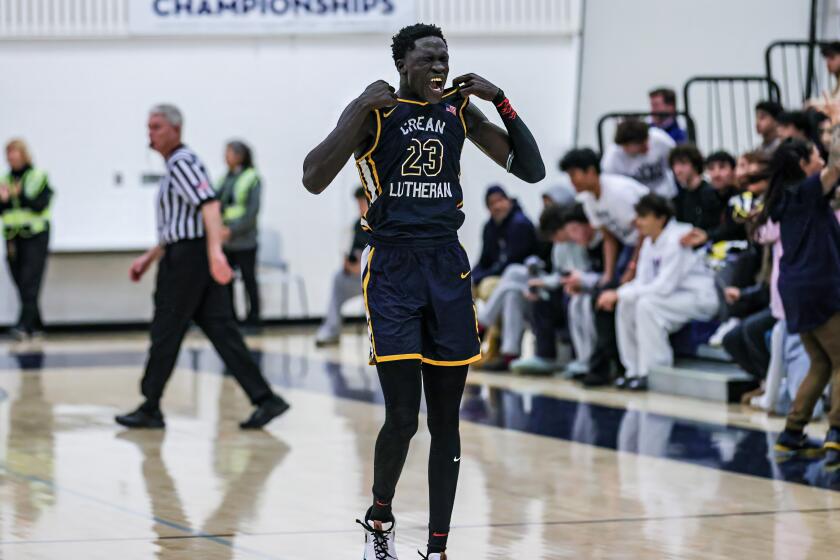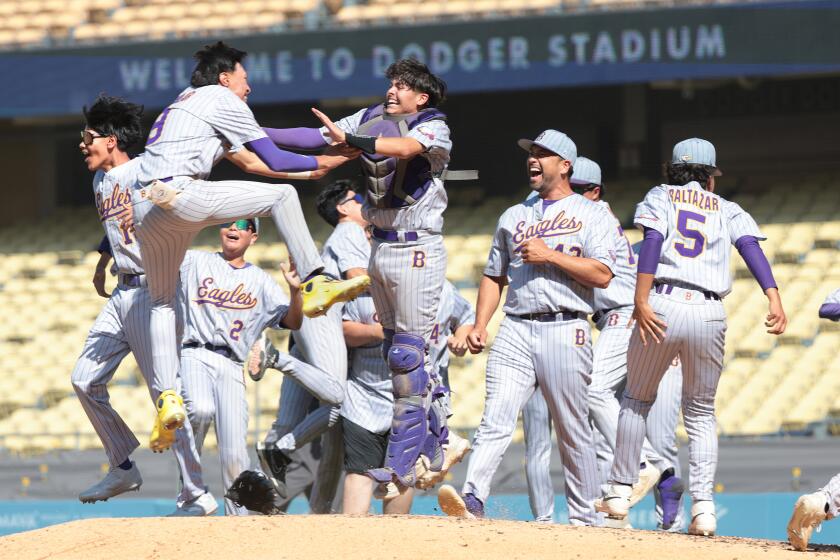A Gentleman’s Room : Regulars Gather to Ponder the Angles of a ‘Thinking Man’s Game’ at North Hollywood Billiards
- Share via
On a hot Wednesday morning, about 30 of the boys, most of them pushing 60, were hanging out at North Hollywood Billiards. The inside of the air-conditioned room was dark except for 18 green-topped tables, which glowed eerily under fluorescent lights. In the shadows, guys with names like Banger Bob and Spinner Sam schmoozed about escrow closings. The TV above the manager’s counter displayed the latest action on Wall Street.
Sitting on a cracked-vinyl chair and eating M&Ms; for lunch, Walt Ledel, a city worker on his break, wasn’t interested in anything but Table 10, where Jose Hernandez was searing the green felt in a game of three-cushion billiards. Ledel was going to school on Hernandez, one of a half-dozen of the country’s top-rated players who play regularly at the Magnolia Avenue room.
“I’m sort of a student of the game, and I come here a lot on my lunch hour to watch the best players in the world,” Ledel said, never taking his eyes from the table as Hernandez’s shot banked off three rails and kissed his opponent’s black-spotted ball. Ledel smiled. “Beautiful. I’d give anything to be that good one of these days.”
Despite neon beer signs in the windows and tacky paneling on the walls, North Hollywood Billiards is not a joint where a hustler is going to get his thumbs broken. It is more like a back-room social club for guys who have never outgrown their appreciation for a game of skill or an opportunity to goof around with their buddies.
“This is a gentlemen’s room,” said Oscar Haurat, a contractor wearing a “Bel-Air” T-shirt.
At North Hollywood, wives are welcome but have the good sense to stay home. Rules are enforced. No cigarette butts on the rails. No sitting on the tables. No gambling. No checks. No spitting. The boys are allowed to swear and are discouraged from hustling. Fighting is forbidden, but arguing is an acceptable alternative.
“You’re blind!” a dark-haired player named Eddie barked at Haurat as they played a game called “golf” on a snooker table. A few onlookers snickered. Hardly anyone else paid attention.
Earlier, Eddie had walked in with a smile and greeted everybody with “What’s happening, babes?” But now he is disagreeing with Haurat over which ball was touched first. Instant replay would have resolved the matter but was not available.
“How can you put them balls back like that?” said Haurat, a burly Argentine. “It’s not even close.”
“Baloney!” Eddie said.
“Don’t tell me baloney! I quit,” said Haurat, walking away with the amused look of someone who’s been involved in the same scene before.
‘Friendly Arguments’
Taking up residence on a bar stool, Haurat said, “We have arguments all the time, but they’re friendly arguments. Things like this happen when two balls are close. But when you get a guy who’s halfway nuts, you can’t argue with him.
“You know, things get crazy sometimes, but I’ve never seen a fight here. I’ve known these people for nine years. Everybody gets along. It’s kind of a trippy place when you think about it. The Anglos and the Latins get together so strongly. The Anglos even use some of our terms. They say pico instead of corner. Isn’t that trippy?”
Tapping Haurat on a beefy arm was Chuck Aldrich, a part-time carpenter who has been a regular since the parlor was opened 25 years ago by Clarence (Tiff) Payne. Aldrich had taken it on himself to plunk a quarter into a parking meter outside. “I didn’t want to see your car towed,” he told Haurat.
Haurat smiled and looked around the long, narrow room, enjoying the camaraderie. “We have something else in common besides pool,” he said. “You know what makes this room so special? There are a lot of businessmen here, rich guys.”
He was overheard by a silver-haired man wearing gold chains. “There’s a lot of money in this room,” Gold Chains said. “The poorest guy here’s worth $300,000. We got millionaires. Guys with Rolls-Royces.”
A reporter asked Gold Chains for his name. “You’re not getting my name,” he snapped. “We’re pool players. We don’t want our names showing up in the newspaper.” He turned to Haurat. “You shouldn’t give them your name.”
Haurat shrugged. “Why not? I’m clean.”
Gold Chains explained: “My kids have decent jobs. You think I want people seeing that their father hangs out at a pool hall? And my son and I have the same name. It could be embarrassing for him. My kids know I come here, but they don’t like it--I come home smelling like cigarette and cigar smoke. They can’t understand why I have to hang out in a billiard parlor.”
For most of the boys, the reason for spending their spare time at the North Hollywood playhouse is the game itself. Three-cushion billiards, played on a table without pockets, requires a deft touch and a scientific mind to calculate angles and English. Fifty years ago, billiards was more popular than pool in the United States. Today, billiards advocates say, it’s enjoying a resurgence in this country. But the best players in the world are the Japanese and the Europeans.
“People in the U.S. don’t want to think,” said Larry Weir, the owner of the parlor. “That’s why chess isn’t a big game here. People like playing backgammon instead. Billiards is like chess. It’s a thinking man’s game.
“I came in here 25 years ago. I was a pool player. There were no games. But some guy was playing three-cushion. I started playing and have been hooked ever since. It’s like a disease.”
Weir spotted Neil Nelson, another regular. “This guy took up billiards and got the disease,” Weir said, a toothpick poking out of the corner of his mouth. “Now he’s got a table in his house.”
“But I got my priorities straight,” Nelson said. “First I got a business, I took care of my family, then I got a table.”
“Nothing is more important than billiards,” Weir said with a straight face.
Nelson was taken aback. “I hope you’re joking, Larry. When I’m playing and the phone rings and it’s a business call, I take the business call.”
Weir, 47, no longer worries about anything but billiards. Six years ago, he retired as the owner of a New Jersey freight company and moved back to Los Angeles. A year later, he bought North Hollywood Billiards and spent $50,000 remodeling. “It was a real dump,” he said. Owning his own room “always gives me a place to play,” he said, half-seriously.
Weir has perpetuated North Hollywood’s reputation as a major-league billiards parlor. The nine antique billiards tables, each about 60 years old and weighing about two tons, are topped in expensive Spanish-made cloth and rare 2-inch slate.
Eight Ordinary Tables
Weir grudgingly acknowledges pool’s existence by means of eight ordinary tables. But the room is obviously segregated: The pool section is in the front half, tables standing under bare fluorescent lights. Billiards is in back, away from the harsh glare of the windows and the distracting noise from video games and the juke box; even the lighting and carpeting are better.
“This isn’t your average pool hall,” said Eddie Robin, former U.S. billiards champion and the only American to ever beat Belgium’s Raymond Culemans, the reigning world champ. “It’s the No. 1 billiard room in the country. It’s got the best equipment and the best players.”
On any given day, it is possible to see a handful of top players practicing on Weir’s tables. Players like Frank Torres--the current U.S. champion, who used to manage the room--and Allen Gilbert, Jose Hernandez, Bill Smith, Paul Ferris, Charlie Milliken and Robin. When Weir held a tournament this summer, half the top 10 Americans showed up, and Gilbert won.
“There’s lots of lifetimes of knowledge in this room,” Robin said. “It’s really an advantage to a younger player to know he can come in here and see several players--not just one--who are extremely knowledgeable. In the ‘50s, when I was a kid in New York, I had to take a subway for an hour and a half one way to Astoria to play with Arthur Ruben, who was then one of the country’s top players. Here you can learn from half a dozen.”
Because of the room’s chummy feel, Weir has considered turning it into a private club, a thought that had also occurred to Tiff Payne, the original owner. Payne owned Tiff’s Billiard Room from 1962 to 1977, using it as a hangout for his cronies. He opened the place with a trick-shot artist named Red Baker after seeing “The Hustler.” Payne said he had a hunch that the movie would make pool and billiards respectable again in civilized society. Indeed, the room became “a lucrative hobby,” he said.
Payne, 77, was a teen-ager from Tiffin, Ohio when he became known as the “Tiffin Kid” after winning a billiards tournament. In 1928, he was a hot-shooting country boy taking on all comers in New York. One of his matches, for $1 a game, was against a pudgy kid named Rudolph Walderone, known then as New York Fats.
“He was 19 and I was 18 back then,” Payne recalled. “Now he’s Minnesota Fats and six years younger than I am. Don’t ask me how it happened.”
Ever since it opened, the North Hollywood room has had a split personality. Regulars filter in around 8 in the morning and leave by 6. In the evening and until closing time at 2 a.m., the place changes character, turning into a pool room. The low-key afternoon chatter is replaced by loud pop tunes on the juke box and bursts of howling laughter. The crowd is younger, a mix of surfer boys and guys with tattoos.
At 9 p.m., about 20 pool players played games like nine-ball and rotation for $2 an hour. Only a couple of billiards players were in the back. Madonna sang on the jukebox. A kid was playing Ms. Pac-Man.
In the middle of the room, Eddie Robin was repairing billiards Table 18. It was stripped to the slate as he attempted to correct a sag at one end.
“They’re never made perfect,” he said, meticulously positioning a carpenter’s level. Aside from proficiency with a cue, Robin is known for his curative skills as a “table mechanic.” He was doing Weir a favor on Table 18. They have known each other since 1979, when Robin won the U.S. title and Weir flew him from Las Vegas to New Jersey to level a table at his home.
“He said, ‘Tell me what it costs, and come out,’ ” Robin said, gently caressing the slate with his hand. “I couldn’t believe this guy. It must have cost him $1,000.”
An off-kilter table can be death to a serious billiards player. Leveling isn’t easy--Robin often spends days overhauling a table. As he painstakingly raised the massive slate a hair on Table 18, one of the billiards players in the back of the room came over to watch.
Rod Curry, a dentist, is restoring a billiards table in his Santa Monica home. It has been dismantled for six months, forcing Curry and a friend, Bill Allen, to drive to North Hollywood to play. They’ve both got the disease.
“Rod’s spent more time working on his table than playing on it,” said Allen, a slow-talking former Midwesterner who has been playing billiards for 50 years. “I don’t think he bought it to play.”
But what did Curry care? “At least,” he said, “we’ve got North Hollywood.”
More to Read
Go beyond the scoreboard
Get the latest on L.A.'s teams in the daily Sports Report newsletter.
You may occasionally receive promotional content from the Los Angeles Times.










